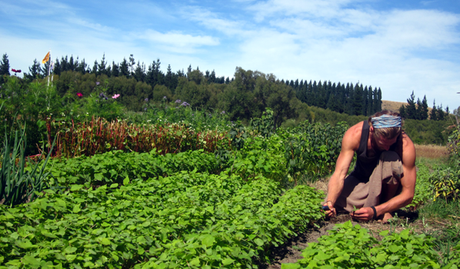
More and more, people who love to travel are looking for ways to continue to see the world while giving back to the communities they're traveling to. They're looking for something more inspiring and rewarding than you're run-of-the-mill vacation on a beach or sightseeing.
One way travelers with the urge to give back during their travels can do so is by Wwoofing. Yes, you read that right - Wwoofing.
Wwoof stands for World Wide Opportunities on Organic Farms. It's an organization that links volunteers with organic farms and growers. Why? According to the organization, the purpose is "to promote cultural and educational experiences based on trust and non-monetary exchanges thereby helping to build a sustainable global community."
In return for volunteer help, WWOOF hosts offer food and accommodation as well as opportunities to learn about organic lifestyles.
Here's how it works for volunteers. You live with your host and join in and help with the day-to-day activities on an organic farm. In most of the countries you can Wwoof, this exchange is based on four to six hours of help for a full day's food and accommodation.
Some of the tasks you may help with include gardening, planting, sowing seed, making compost, weeding, cutting wood, harvesting, packing, milking, feeding livestock, repairing or building fencing, making mud bricks, or making wine, cheese or bread.
You'll negotiate how long your stay at the farm is with your host, but most Wwoof stays are one to two weeks. However, you can stay as short as two or three days or as long as six months.
There are many countries around the world with national Wwoof groups and there are also countries that don't have a national Wwoof group yet, but do have hosts. You can Wwoof in more than100 countries around the world; see a comprehensive list here.
Wwoof isn't a new movement - for more than 40 years, it has spread from country to country. It was originally called "Working Weekends on Organic Farms" when it initially started in England in 1971. It all started with one woman living in London with the desire to access the countryside and support the organic movement.
Over the years, the demand for longer visits to farms increased and the name of the organization evolved to "Willing Workers on Organic Farms." However, the word "work" in this name caused some controversy in certain regions, being associated with migrant work. In 2000, the group officially became known as "World Wide Opportunities on Organic Farms
Today, there are more than 50 Wwoof groups around the world. Wwoofers have contributed thousands of hours of help to organic growers and Wwoof hosts have lended their time and experience to Wwoofers, teaching them about a new life-changing way of life.
Would you ever consider Wwoofing? Let us know your thoughts on this topic, in the comments section below.

